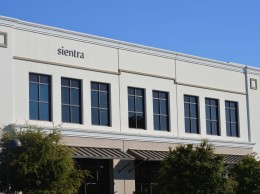Sientra’s CEO tells of startup’s struggle and success
In 2007, it seemed like an simple path to success: Sientra, a startup led by breast implant industry veterans, would acquire a portfolio of silicone implants, raise money and seek approval from the U.S. Food and Drug Administration to become the first new player in the industry in two decades.
Between then and now, however, a financial crisis ticked off a global recession, a new presidential administration and new FDA regime took a new approach to medical devices and venture capital became much, much harder to come by. Those were what Hani Zeini, Sientra’s CEO, called the “dark days.” His company came through them, winning FDA approval in March 2012 and raising $151 million.
“You’ve got to lead. Your job as a leader is a merchant of hope,” Zeini told an audience of about 100 Central Coast MIT Enterprise Forum on Jan. 16. “The clarity of vision is what’s important at these times.”
Zeini told the story of Sientra’s startup struggles and success at the forum, which seeks to foster technology and entrepreneurship on the Central Coast. Sientra, which Zeini founded in 2006, sought to become the first new firm to offer breast implants. The space was dominated by Allergan, which was formerly Inamed and was Zeini’s former employer, and Mentor, which has since been acquired by Johnson & Johnson.
Zeini said the FDA approval process is so “monumentally high that it becomes, on its own, a barrier to entry.” So the company bought up the assets of Silimed, a firm that was already part way through the process of FDA approval.
Zeini recalled the halcyon fundraising days of 2007, when money flowed like milk and honey for a team like his with industry experience that wanted into a good market. “Aesthetics was a sexy market. Everybody wanted to be in it,” he said.
He put together what he called an “amateurish” deck of 20 slides, showed it six times, and raised $86 million. “I didn’t even have to knock on doors to raise money,” he said.
Shortly after, the markets faltered and a new president imbued the FDA with a new outlook. “There was a new sheriff in town, and the idea was that this sector, the medical device sector, had gotten a free ride for too long and it was time to change that,” Zeini said.
That’s when the days got dark for the firm. Originally, its worst-case scenario planning predicted FDA approval in 2010. Everyone had expected approval even faster. Now it looked as though it might be longer — years longer.
“We couldn’t control the financial markets. We couldn’t control the FDA,” Zeini said.
What he could control, however, was his company’s approach. Sientra got creative: When the FDA wanted better patient follow-up in studies, the company hired private investigators and even social media experts to track people down so it could ask follow-up questions, for example.
“We realized that at the FDA, there’s a new team. We realized our job was not to fight them, as was the temptation, but to embrace them and manage them,” Zeini said.
By 2010, however, there was still no approval in sight. Sientra still had plenty of money, but the question was whether it would have enough money to market the products after approval if the process took several more years. So the firm went back on the fundraising path looking for big investors — which seemed crazy in 2010. “I started the company with a tremendous runway, and all of a sudden the runway was getting closer and closer to running out,” Zeini said.
This time, the slide deck had 45 “incredibly professional” slides. The firm was on the road for 11 months and had nearly 50 meetings. In the end, it secured a deal: A group of investors promised $65 million if Sientra got FDA approval for its products. That took out the risk for the investors, but it locked them into the funding if approval did come to pass.
Sientra secured approval in 2012. It still faces major challenges — Mentor filed an unfair competition lawsuit after Sientra hired away several members of its sales team — and there’s also a new medical device tax designed to fund the Affordable Care Act that Sientra will be passing on to its customers. A member of the event’s audience asked about the tax.
“I’ll keep my opinion to myself. It is absolutely insane and irresponsible,” Zeini said of the tax. “The logistical administration is horrendous,” he said, noting that surgeons take months to pay for products while the tax is collected every two weeks. “I’ll keep my opinion to myself on how this impedes progress and innovation,” Zeini said. The government “needs to understand the difference between a company that is one month old and that is 100 years old … and uses every trick in the book to hide their money overseas,” he said.
Market challenges aside, Zeini gives full credit for Sientra’s success so far to the firm’s staff. He said that no matter what happens to the company itself, its people will always be able to say they brought the first new breast implants to market in 20 years.
“We’re not a company, we’re not a team. It’s the Sientra community. I’m proud of its unique culture,” he said.









